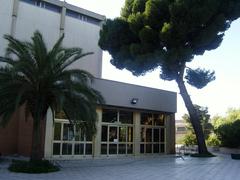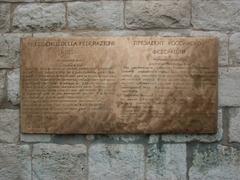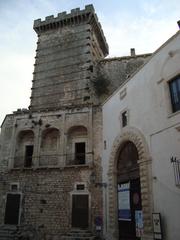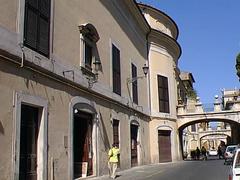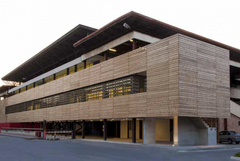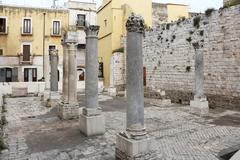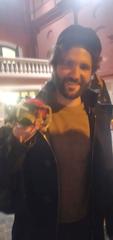Museo Strumenti Di Chimica: Visiting Hours, Tickets, and Guide to Bari Historical Sites
Date: 14/06/2025
Introduction
The Museo Strumenti Di Chimica, located within the University of Bari Aldo Moro’s Department of Chemistry, is a unique institution dedicated to preserving and presenting the evolution of chemical and scientific instrumentation from the late 19th century to the modern era. As an academic and cultural landmark, the museum not only showcases rare laboratory apparatus and historical teaching materials but also serves as a hub for scientific education, research, and public engagement in Bari—a city renowned for its role as a Mediterranean crossroads of ideas and innovation (Accademia di Belle Arti di Bari, Musei Italiani, University of Bari).
This comprehensive guide covers everything you need to know about visiting the Museo Strumenti Di Chimica in Bari, including its history, collection highlights, educational mission, practical visitor information, and how to make the most of your visit by integrating it into your exploration of Bari’s historical sites.
Contents
- Historical Background
- Origins and Development
- Bari’s Role in Scientific Progress
- Preservation of Scientific Heritage
- Visitor Information
- Opening Hours and Tickets
- Location, Access, and Amenities
- Accessibility Details
- Academic and Cultural Mission
- Educational Programs
- Research and Community Engagement
- Digital Initiatives
- Planning Your Visit
- Travel Tips and Nearby Attractions
- Suggested Itinerary Integration
- Frequently Asked Questions (FAQ)
- Summary and Recommendations
- Sources and Further Reading
Historical Background
Origins and Development
The Museo Strumenti Di Chimica, or Museum of Chemistry Instruments, was established as a specialized academic resource to support the University of Bari’s commitment to scientific education and research. Initially serving faculty and students, its collection has grown to include a wide range of historical apparatus, original laboratory equipment, and rare scientific documents. These items collectively narrate the progression of chemistry as a discipline and reflect the university’s prominent role in Southern Italy’s academic and scientific landscape (Accademia di Belle Arti di Bari).
Bari’s Role in Scientific Progress
As a vibrant Mediterranean port city, Bari has long facilitated the exchange of scientific ideas and innovations. Its academic institutions attract scholars from across Italy and abroad, fostering a dynamic environment for scientific advancement. The Museo Strumenti Di Chimica embodies this tradition, displaying tools and techniques foundational to chemical research and education in the region. The museum’s holdings reflect the evolution of laboratory practices, from artisanal glassware and balances to sophisticated 20th-century spectrometers and electrochemical devices (Musei Italiani).
Preservation of Scientific Heritage
A central part of the museum’s mission is the preservation and restoration of rare chemistry instruments, original laboratory notebooks, and teaching aids. These artifacts provide valuable insights into the daily work and pedagogical methods of chemists, highlighting both technical innovation and the cultural significance of scientific progress.
Visitor Information
Opening Hours and Tickets
- Visiting Hours: The Museo Strumenti Di Chimica operates primarily on an appointment-only basis, Monday to Friday, 9:00 AM – 5:00 PM. There are no regular public hours, so advance booking is essential (ViaggiArt).
- Tickets/Admission: Admission is typically free, reflecting the museum’s educational mission. Special guided tours or workshops may require booking.
- Booking: Contact the Department of Chemistry at the University of Bari via their official website to schedule your visit.
Location, Access, and Amenities
- Address: Via E. Orabona, 4, 70125 Bari, Italy (within the University of Bari Aldo Moro campus).
- Transport:
- Public Transport: A 15-minute walk from Bari Centrale station; multiple city buses stop nearby (The World Was Here First).
- By Car: Limited street parking; paid lots nearby.
- On Foot/Bicycle: Easily accessible from the city center; Bari is bicycle-friendly.
- Amenities: Restrooms are available within the university building. There is no café or shop on site, but staff can provide reading materials and information upon request.
Accessibility Details
- Physical Accessibility: The university campus and chemistry department are equipped with ramps and elevators. Confirm specific needs when booking.
- Language: Tours are primarily in Italian; English-speaking guides can be arranged with advance notice.
Academic and Cultural Mission
Educational Programs
The museum is dedicated to advancing chemical science education at all levels. It offers:
- Guided Tours: Led by faculty or expert staff, tailored to different audiences.
- Hands-On Workshops: Interactive sessions for school groups and educational institutions.
- Curricular Integration: Programs developed in collaboration with local schools and universities.
Research and Community Engagement
The Museo Strumenti Di Chimica collaborates with academic departments, research institutes, and cultural organizations to support the study of the history of science and to promote scientific literacy. It participates in national and regional events such as the Giornate FAI di Primavera and Giornate FAI d’Autunno (Comune di Bari – Arte e Mostre), and works with institutions like the Consiglio Nazionale delle Ricerche (CNR) on conservation science projects (dsctm.cnr.it).
Digital Initiatives
The museum extends its reach through online catalogues, virtual tours, and high-quality images of its collections, making its resources accessible to a global audience (Musei Italiani).
Planning Your Visit
Travel Tips and Nearby Attractions
- Best Time to Visit: Spring and autumn, particularly during cultural events like FAI Days.
- Nearby Sites:
- Basilica di San Nicola: Iconic 11th-century church and pilgrimage site.
- Castello Normanno-Svevo: Historic fortress with panoramic city views.
- Bari Vecchia: The old town, filled with narrow streets and authentic eateries (savoringitaly.com).
- Pinacoteca Corrado Giaquinto: Art museum nearby for a combined science-and-art itinerary (TravelTriangle).
Suggested Itinerary Integration
- Morning: Museo Strumenti Di Chimica, followed by coffee in the Murat district.
- Afternoon: Visit a nearby museum or explore Bari Vecchia.
- Dining: Sample Apulian cuisine at local trattorias after your visit.
Practical Tips
- Photography: Permitted in most areas, but check in advance regarding flash use.
- Duration: Plan for 1–2 hours, including any workshops or guided activities.
- Documentation: Researchers can request access to archives and additional materials.
Frequently Asked Questions (FAQ)
Q: What are the Museo Strumenti Di Chimica visiting hours?
A: Visits are by appointment only, Monday to Friday, 9:00 AM – 5:00 PM. Always book in advance.
Q: Are tickets required?
A: Admission is generally free, but advance booking is required.
Q: How do I book a guided tour?
A: Contact the University of Bari’s Department of Chemistry via their official website.
Q: Is the museum accessible to visitors with disabilities?
A: Yes, the building is equipped with ramps and elevators, but confirm specific needs when booking.
Q: Are tours available in English?
A: Yes, with advance notice.
Q: Can I take photographs inside the museum?
A: Generally yes, but inquire about specific policies.
Q: Does the museum offer virtual tours?
A: Yes, online virtual tours and galleries are available.
Summary and Visitor Recommendations
A visit to the Museo Strumenti Di Chimica offers a unique opportunity to explore the scientific heritage of Bari through its carefully curated collection of historical instruments and educational programs. With a personalized, appointment-based approach, visitors receive tailored tours and insights into the evolution of chemistry as both a science and a cultural force. Its central location makes it easy to combine with other significant landmarks in Bari, and its ongoing digital and educational initiatives ensure accessibility for wider audiences. Plan ahead, engage with workshops, and explore the museum’s virtual resources for an enriched cultural experience. Stay connected and informed about special exhibitions and events through the museum’s official channels and by using resources like the Audiala app (Comune di Bari, Musei Italiani, University of Bari).
Sources and Further Reading
- Accademia di Belle Arti di Bari
- Musei Italiani
- cultura.gov.it
- University of Bari
- Comune di Bari – Arte e Mostre
